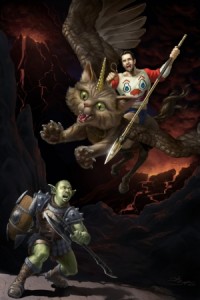If you’ve been following my blog lately, you’ve probably read more about me than you have in a long time. While there’s a lot of reasons why I wanted to open up more, some of which will relate to my upcoming publications, there’s another one that I wanted to explain to you.
You see, even though we are all writers and we’re all different, there’s something interesting that happens when we write characters. By describing what a person looks like or what they’re interested in, we put them into buckets or categories without even realizing it. Geeks. Athletes. Artists. Musicians. Doctors. Reporters. Detectives. These keywords define our characters by placing them into tribes, but they can also limit them.
If you didn’t know me, what would you think if I told you I was a gamer? Or that I have performed a lot of occult research? Or that I enjoy cooking? Love yoga? Have a lot of business acumen? Now, what would you do if I were to tell you that I am of European descent? A woman?
Traditional psychology spells out for us that this is how our human minds naturally function. We need to put things into buckets in order to process, record and store information. Even within the geek culture, which has a reputation for embracing different types of people into its own tribe, there are groups within groups that create separate micro-tribes of people. If you look closely enough, you can see this effect in every organized and unorganized aspect of your life. After all, every business has its own culture or tribe. The same goes for volunteer organizations, too. Sure, you might argue that we are drawn to the tribes that we’d best fit into, but what if you’re not? Logistically, it’s impossible for you to fit the criteria of every tribe that you may be in contact with, because that criteria is often shaped by certain people within the tribe depending upon how long they’ve been involved with it and what they have to gain (or lose).
Over the years, I’ve talked to a lot of writers and editors about this idea and I’ve found that most of them feel the same way that I do. All too often, we may feel like outsiders or the alien one within any one tribe for a variety of different reasons. While being an outsider does suck, our role as the outsider allows us to communicate appropriately with other members of the tribe in order to tell them a story.
Today, how we view the outsider is a reflection of our modern, unforgiving culture. In olden times, the role of the storyteller fell on the shoulders of a traveling bard or performer, who was expected to a tribe in and of himself. It’s very challenging for most writers to naturally drift toward a tribe because we are self-aware in a way that automatically sets us apart, which can cause an endless amount of neuroses because there are one too many social stigmas about how wrong it is to be alone. Ever go out to dinner by yourself? When was the last time you treated yourself to a movie? Our culture is not geared for people who are social introverts, because our society is built to either repel the outsider or worship it. In a way, you could say that our culture doesn’t know what to do with an outsider, even though people automatically create them by separating others into tribes. I know I’m glossing over the social implications here, because sometimes the outsider is a very real or criminal threat. In this case I’m saying that the average guy on the street who goes to see a movie by himself might not have ulterior, criminal motives. He (or she) might just be lonely or they might have wanted to see a movie.
The funny part about writers, though, is that we have a different role to play than if we were a member of a tribe. By our very nature, we have to have some distance between ourselves and other people; otherwise we become homogenized and lose our unique perspective on the tribe. For this reason, I think this is why it’s so hard for people to be inclusive of other cultures, even when they’re intentionally thinking about it, because it’s counterintuitive to their natural instincts. Of course, many tribes make decisions just for the sake of attracting others like them because they know what to do with them. The more people (or the more popular) a particular tribe gets, the harder it will be for the tribe to remain as it is without changing. That, more than anything, is what I think freaks out most tribes. In many cases when a person doesn’t fit into a tribe, it’s because they don’t naturally fit into the group and not because they are somehow bad or good.
Of course, the role of the outsider doesn’t just apply to a writer. It simply describes “the other,” which is a natural by-product of human psychology. Not all things will fit into the same bucket, because we will find a way to separate them. The questions that I’m exploring right now are: How do I write a story for a tribe without automatically creating or punishing an outsider in the story arc? Is it even possible? Or should I avoid trying to be all-inclusive and focus my efforts solely on the tribe itself?
Guess you’ll just have to wait and find out.
 A few months ago, I mentioned that I had written a fan fiction story for the unicorn pegasus kitten beast of doooooooooom. (Or whatever you want to call it.) While I did not win the contest, two other fine authors did. Now you can download the collection of short stories for free and make a donation to fight Lupus.
A few months ago, I mentioned that I had written a fan fiction story for the unicorn pegasus kitten beast of doooooooooom. (Or whatever you want to call it.) While I did not win the contest, two other fine authors did. Now you can download the collection of short stories for free and make a donation to fight Lupus.
 If you’ve been following my blog, you may have seen my earlier post about
If you’ve been following my blog, you may have seen my earlier post about